#especially when these inherent parallels exist
Text
Been thinking about why the argument that OFMD is inherently a bad show because it's based on historical slaveowners so often feels disingenuous to me as a person of color.
HUGE disclaimer up front: if you don't wanna fuck with the show because of that premise right out the gate, that's 100% valid and I completely get that. I'm not talking about that. What I'm specifically talking about is White fandom people in particular who argue that OFMD must be "problematic" because of this, especially when they say this as some kind of virtue-signalling trying to win points in fandom wars, stuff like that.
My big thing is that the resemblance the characters in OFMD have to their real-world namesakes begins and ends with having the same name. The show feels more to me like it's playing with the vague myths around these names, not the people themselves. Can you make an argument that they should have come up with original characters instead? Sure, but let's be honest, even people who study the irl counterparts have very little knowledge of their actual lives, and the average person has all but none. To add to that, this show has absolutely zero interest in historical accuracy; the moment they cast a Jewish-Polynesian man as Blackbeard that became obvious. No one is saying the real-life Blackbeard and Stede Bonnet were good people, least of all the show itself; the point is that OFMD's versions are basically original characters already.
It always feels like an incredibly disingenuous claim to parallel the show to Hamilton, because Hamilton both did care about historical accuracy and also brought up the slave trade. Hamilton is uncomfortable for so many poc because it writes poc into the story of otherwise very faithfully portrayed racists, colonizers, and slaveowners and just handwaves the racism. In OFMD, racism exists, but the stance is always explicitly anti-racist and anti-colonialist in a way that is just so fun to see (whom among us has not wished to skin a racist with a snail fork?).
The other thing that sticks for me is...there's an appropriate amount of slavery I want to see in my romcoms, and that amount is none. I am so sick of historical fiction where Black characters are only there for trauma porn about the horrors of the slave trade. You can make a legitimate argument that OFMD is handwavey about the slave trade, but I'd argue that including discussion of the slave trade is something that should be done with such incredible care that it would leave us with a show that can't really be a comedy at all anymore. OFMD's characters of color are allowed to be nuanced, complex characters with their own emotions, and it's incredibly refreshing to see, and I'd much rather have that than yet another historical fiction show where the only characters of color are only there to make White audiences feel virtuous about how sad they feel for them.
In conclusion, I guess: every yt person who makes this argument to win points in a fandom war owes me and every other fan of color a million dollars
3K notes
·
View notes
Text
In Judaism, one alternative way of referring to converts is "Jews by Choice."
If a parallel term exists in Xtianity I am not aware of it, but I would like to propose that it really should exist, albeit not just in reference to converts but to all Xtians. Every Xtian should get the opportunity to fully understand their faith in context and to make an informed decision to choose it for themselves. As it stands, many Xtians are deeply ignorant about Jewish history (before and after the formation of Xtianity), the original cultural context for the stories in the Old Testament, the cultural Jewish context that Jesus existed and taught in, the critical historical (scholarly) read of these texts, what they probably meant to the Israelites who produced them, and what they mean to Jews today and how we read these same texts differently in our religious context.
This creates a problem, where Xtians are taught only the narrow band of context that their church deems it important for them to know, and even that is frequently inaccurate or so limited in scope as to make it inaccurate by omission.
And this is because the reality is that the Tanakh (that is, the Hebrew and Aramaic scriptures that the Old Testament is based on) does not naturally or inevitably lead to the Jesus narrative. If you are starting from a Xtian perspective, and especially if you read the New Testament first and then and only then dive into the Old Testament, the Jesus narrative is obvious to you because you are looking for it, expect to see it there, and are coming at these texts with that reading lens in mind. And it's not that you or anyone else is nuts to see that narrative there - there are plenty of solid Xtian reads of these texts that make sense if you already believe in Jesus as presented by the New Testament.
But what the vast majority of Xtians aren't taught is how to approach the Tanakh from a Jesus-neutral perspective, which would yield very different results.
Now you might fairly ask, why would they *need* to approach the Tanakh with a Jesus-neutral perspective? They're Xtians! Xtians believe in Jesus, that's what makes them Xtians!
My answer is multi-pronged: First, I believe that G-d wants a relationship with all people, and speaks to us in the voice we are most likely to hear. That's inherently going to look different for everyone. And that's okay! G-d is infinite, and each of our relationships with G-d are going to only capture the tiniest glimpse into that infinite Divine. Therefore, second, when approaching religion, everyone sees what they want to see. If you nothing religion but find your spirituality in nature, you're going to come at these biblical texts with that lens and take away from them similar things that one might take away from other cultural mythologies. If you, like me, are coming at these texts with a Jewish mindset, you are going to come away with a portrait of Hashem and our covenantal relationship as Am Yisrael. And, of course, if you read with a Xtian lens, you're going to see the precursor narratives leading up to Jesus. That reading bias is not only understandable but good or at least deeply human. Everyone sees what they want to see in these texts. There is no objective or flawless way to read them, and to claim that there is, is to claim that not only is there only one answer, but only one kind of relationship that G-d wants to have with people, that you personally happen to know what that is, and that everyone else is wrong. I am sorry, but if you believe that - if you truly think that you in particular (and/or the people you happen to agree with) know the mind of G-d, then you do not worship G-d. You worship yourselves, because to know the entirety of G-d would require you to be G-d. There's a term for that. That doesn't mean there aren't wrong answers too. But it does mean that there is no singular unimpeachable reading of the texts. What you see in these texts then, says far more about you than it does about the texts themselves or G-d.
So the question then becomes: Why do you want to see this? (Whatever your "this" is.) If your read of these texts is something you choose, why do you choose to see what you see? And is it a meaningful choice if you are not taught other ways of knowing, other perspectives on these texts, and to think critically while exploring them?
Judaism inherently teaches a multiplicity of opinions on the texts, and maintains that they can be read to mean different things, even at the same time by the same person. Deep textual knowledge and methods for learning more, asking questions, challenging accepted answers as a way to discover new meaning, and respectful disagreement are baked into our culture and methods. Some Xtians of some denominations have analogous processes, although on the whole still emphasize correct unified belief over correct action with a multiplicity of belief. I am not suggesting here that Xtians stop approaching their own scriptures as Xtians or adopt Jewish methods instead. What I am suggesting is that Xtians should be taught a fuller picture of these texts and learn other perspectives so that they (1) understand their own beliefs and why they believe them (or after further inquiry if they believe them), and (2) understand and respect that this is what they are choosing to believe and that it is not the only thing one could reasonably believe. Because (3) if not, they are more susceptible to having their faith shattered at random by something unexpected, and will connect less to their faith as a relationship with G-d and more as an obligation based on an unchallenged world view.
And, frankly? (4) It will help them to be better neighbors, to love their neighbor as themselves, and to give to others the respect that they would like to receive.
Being taught the historical context, Jewish history before and after Jesus, the differences between the Old Testament and the Tanakh, the timeline of the development of Xtianity in relationship to rabbinic Judaism in the wake of the destruction of the Second Temple, the development of church doctrine and the various splits amongst the denominations, and Jewish readings of the Tanakh would give clarity and desperately needed context to Xtians about their religion. Is there some risk that some people, upon understanding these things would drop out of faith entirely or, like me, discover that they are actually meant to be Jews? Yes, definitely.
But let me let you in on a little secret: you don't want those people to begin with. You really don't. Because the reality is that if a person is not called to relate to G-d through Jesus, eventually that person will learn this about themselves one way or another. If they are given the information and tools to make a meaningful choice, they will part company on good terms. If not, they will likely become disillusioned and leave the church in pain, anger, and even trauma. They will bring that out into the world with them, and spread the bad news about the Good News making it even more likely that other people who were already on the fence will jump ship on bad terms. You cannot trick people into a meaningful relationship with G-d. You can only give them the tools they need in order to explore on their own and the rest is between them and G-d.
And the bottom line is that you don't need to and should not be afraid of knowledge. If your faith cannot stand up to scrutiny, then it deserves that scrutiny tenfold. The people you lose from the flock? You would have lost them anyway, because we aren't in the driver's seat here. G-d is. Hashem called me to be a Jew with just as much love and desire to connect as G-d calls Xtians to the church and to Jesus. A faith examined is a faith deepened or exposed in its weakness. And if it is the latter, don't you want people to know this sooner rather than later in order to fix it?
So my proposition and wish for Xtians is that they become Xtians by Choice. That they delve deeply into the origins and context of their faith so that they can be 100% certain that they understand their Xtian faith and why they choose to relate to G-d through that lens.
#every hour is theology hour around here apparently#interfaith#this is tochecha from an ex-Xtian ger#who desperately wants for my Xtian family friends and neighbors the level of peace and security in their faith that I now enjoy#the church is not doing its congregation any favors by under-educating them on these matters#Xtians deserve better and should demand better from the church#xtianity#anyway if I have any Xtian followers here who would like book suggestions lemme know
573 notes
·
View notes
Text
slime video analysed thru horror with a queer pov
kay it gets its own post because im stil aaa bout it
This is just what I remember/was able to brush up on, since I studied this in 2019, so if anything is outdated I apologise, feel free to correct me, I love to learn!!
also I realized it has all become a lil rambly as I couldn’t contain my excitement soz
So this is my essay on the parallels of queerness in the horror genre and how DanAndPhilCRAFTS - Slime (2024) could be analysed in this light, especially given the creators’ personal history with the topic.
Among the classic tropes of the horror genre, is the topic of losing ones innocence.
Most emphasised is the loss of ones virginity, as a synonym for the innocence, although the innocence as such has many forms. As mentioned in Scream (1996), you may not survive if you have sex, if you drink/do drugs, or if you claim to “be right back” or in other ways investigate to satisfy your own curiosity.
The parallels to the christian church and societal norms are already obvious. If you deviate from the path of purity, it will lead to death and suffering. The only way to survive the night, is to stay pure. Do not be tempted by mere curiosities, for they will be the death of you, essentially.
In the same light, Baphomet is most often portrayed with characteristics from both the male and female human anatomy, and can be used as a metaphor for the inherent evil of gender expressions beyond the societal norm.
In the same light, monsters in various movies are often shown with a deviance in gender and/or sexuality. This role of ‘sexual outsider’ has, for years, been a symbolism that queer people have connected with. The has only further skewed the ‘stay pure’ narrative, as it brings on an ambience of kill or be killed. An either/or of sorts. But it has also made monsters and villains walk the line between sexy and terrifying, which naturally leads people to be enticed. We are sexual creatures afterall.
Often the monsters have an aura of masculine energy, as they make people cower, and the stereotypical jocks abandon their hardcore exterior. This, on one hand birthed the “the boyfriend is the killer” trope, but it also gave way for diving into morality, how many crimes can a villain get away with, as long as the character resonates with the audience.
This is demonstrated in Jennifers Body (2009) which was, at first, marketed to the male audience, making the monster Jennifer an attractive young woman, essentially getting the film marked as “Twilight for boys” by film critic Robert Ebert.
The ratings, however, were lackluster and claimed the movie was neither funny nor scary and thus was unsuccessful. Jennifer wasn’t “as hot as you’d hope she’d be” and essentially the “lesbians-for-the-male-gaze” marketing to boys 17+ failed.
However, many women and young girls between 17-25 saw the character of Jennifer as empowering and resonated with the film. My theory is that the men did not like being the victim, being killed my something that they are supposed to be worse than. But the women saw a strength in the conflict between what is essentially two sides of the same existence - on one hand the rage of the injustice and gender inequality, and on the other hand Needy, who follows every character trope connected to the “last girl standing.” Except even she is tainted in the end, killing Jennifer and losing her innocence. (more talk about innocence, murder/virginity bla bla bla, okay but this essay aint about that)
All this plays a role in how the queerness of DanAndPhilCRAFTS - slime (2024) can be interpreted. Throughout all four installments of the narrative, Dan is seen being guided by Phil and scolded when he doesn’t do it right. Phil seems not at all surprised when Dans glitter face turns satanic, and by the third video, Phil hands the control over as he gives himself away.
Essentially, the indoctrination of Dans role in Phils devotion is cult-like. Cults are often hidden behind a facade of “found family” before the true behind-the-scenes terror is revealed. Dan is evidently comfortable in letting a more experienced person guide the way, despite his own hesitance. He knows that he cant do this halfway.
also the idea of Phil rising from the dead, during Easter… Jesus Christ, where would we even begin (lol)
But beyond that symbolism, It is the hesitance in Dans nature that seems to point to the “purity being tainted” horror trope. Phils devotion to Him is evident, but Dan seems more so to be devoted to Phil. A follower. Believing whatever Phil believes to be true. A Billy and Stu, Scream situation, if you will. The subtext of two lovers and the blurred lines of love and death, which has been analysed and discussed a whole while by smarter people than me.
Dans hesitance to follow Phil guiding him to the other (queer) side. The penetrative stab and the menacing disarray of emotions on Dans face afterwards. This was anything but a selfish act, but he gave into the curiosity, he is not the last survivor, he has joined Him. This ritual was giving into love, without trying to contain, rationalise, or diminish any part of it.
(Kind of how like dan, selfproclaimidly, would still be a ‘Daniel in denial’ if Phil hadn’t come into his life, because Phil ‘led him astray’ but he’s very okay with it and he has embraced it, and he’s happier giving in instead of fighting it?? Too far??)
#dan#phil#dan and phil#dnp#daniel howell#amazingphil#danandphil#dan howell#dandandphilgames#danandphilcrafts
190 notes
·
View notes
Note
As someone who’s Chinese w/ a degree in social science + (art) history regarding East Asia I’m always super intrigued and interested to how others interpret changes in new titles on older religious texts- but I will ask in particular if you have any personal ties to Buddhism/Taoism/Confucianism (and Chinese culture) when you find yourself interpreting BM:W’s change in allegorical use of Buddhism as contemporary political adherence! BM:W’s religious and soul mechanics follows their previous game without much overt linking between the two.
Overthrowing Gods in East Asian media is a very common trope in videos specifically due to player involvement (contrast to books where you are separate as the audience) and often is used as an allegory for the system/recent events we exist in. In such it does shift a lot from the original text in base but I think it’s not supposed to relay the same allegory due to the time period in which the writers exist! Wukong’s story changing to him still being chained by the principles that envelop life is far more relatable to late-stage capitalist environments viewers and artists exist in- as such he fulfils the contemporary variant of his original role in JTTW!
I think the change in purpose the Buddhist mythos serves in this game is decisive by nature due to inherent bias present in the original text as a religious piece, and such is core to the allegory. However I don’t think BM:W is supposed to relay that allegory, I think it is supposed to branch off on its own as an alternate contemporary extension of the foundation JTTW set out (plus with the 2 DLC’s on the way, there is plenty of time to extend the universe in game to validate a shift in religious purpose compared to the cut 7 chapters planned during development). And such i think attributing it to the CCP can be a bit of a touchy statement (especially if one doesn’t have long standing ties to East Asian culture or Regional religious practice!) and can accidentally play into sinophobic phrasing and attitudes.
Buddhism as a practice and way of life has a very different presence in writers centuries ago compared to now, as well as how we use religion in audience-involved stories. And such I find it an interesting shift regarding a game made with an international and widely multi-religious audience (that isn’t consuming it as a psycho-socio poem compared to a much smaller and more culturally homogenous readerbase. I think the friction caused by thematic changes is more due to how the game relays the physical journey so closely with reusing characters and having to shift them according to the foundational changes- if it was closer to other written “sequels” that created characters connected to the original cast through descending from them etc, the changes wouldn’t grate on completed arcs or how we compare the experience to wukong’s parallel one
No, I do not have any direct personal cultural connection to Buddhism, Daoism, or Confucianism. I live in Asia, though, and beyond my research of JTTW, I do study religion here (with more of an emphasis on folk religion as it pertains to the Great Sage). My negative view of Black Myth: Wukong is colored by my deep love for the original story. In general, I don't like adaptations.
Thank you for your explanation of the game.
#Asks#Journey to the West#JTTW#Sun Wukong#Monkey King#Black Myth: Wukong#Black Myth Wukong#Chinese religion#Buddhism#Taoism#Daoism
88 notes
·
View notes
Note
Just curious, what's the "pink scare"?
I misspoke; I was referring to the Lavender Scare.
The Lavender Scare was an American political movement that lasted roughly from 1947 to 1956, paralleling the 2nd Red Scare. It was largely helmed by Joe McCarthy and Roy Cohn and was a targeted campaign of political attack against queer people. The reasoning behind it was that gay men and lesbians constituted a threat against national security because their "subversive behavior" (not being straight) meant they somehow had strong connections to communism and, therefore, the USSR.
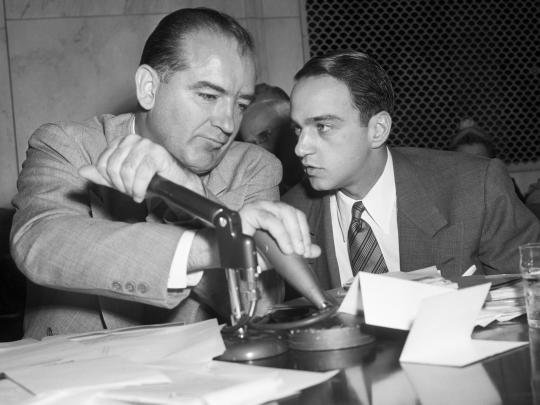
The movement resulted the outing and firing of hundreds of queer people from government jobs (ranging from politicians, clerks, military personnel, and contractors working with the government) with the State Department reporting that by 1953, they had fired 425 people under allegations of homosexuality. It also resulted in Dwight D. Eisenhower's Executive Order 10450, which fully barred any "homosexuals" from working any positions in the federal government.
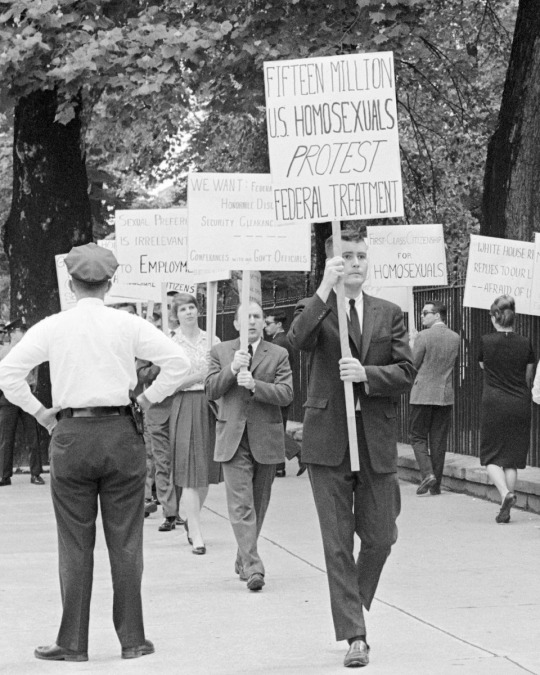
EO 10450 was partially repealed in 1975 largely in response to young men using claims of homosexuality to dodge the Vietnam draft, and again in 1995 when the Bill Clinton administration instituted the "Don't Ask Don't Tell" policy for military personnel. It wasn't fully and completely repealed until 1998 with the Bill Clinton passing Executive Order 13087, which prohibited any such discrimination in federal employment and wasn't EXPLICITLY repealed until Barack Obama's Executive Order 13764 wich took effect in 2017.

The cultural effect was an amplification of pre-existing societal homophobia to violent extremes and the promotion of the idea that queer people are inherently dangerous to "American freedom and democracy". Fun fact, Roy Cohn was actually a gay man who was very openly in sexual and romantic relationships with many men, even during The Lavender Scare, bit considered himself to be different from other gay men, basically because he was a dominant top. He died of AIDS while being part of the federal government's inaction campaign in response to the pandemic.
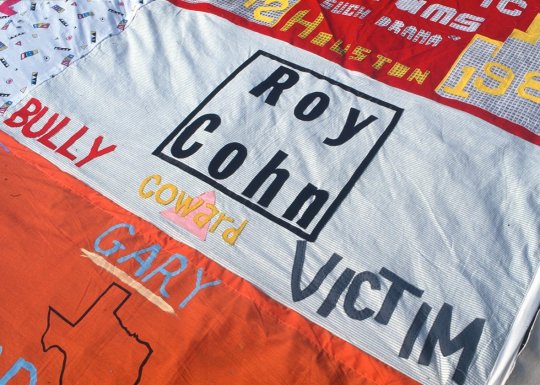
If you want to read more about it, the Wikipedia page is a decent place to start.
The point I was making in regards to there being a 2nd Lavender Scare happening right now is in reference to the growing wave of targeted transphobic policies and violence from the political right and the liberal inaction in response to it.
I'd say that this new Lavender Scare started in 2017 with Trump's banning of trans people from entering the military and has continued to the present day when it is rapidly escalating with no end in sight.
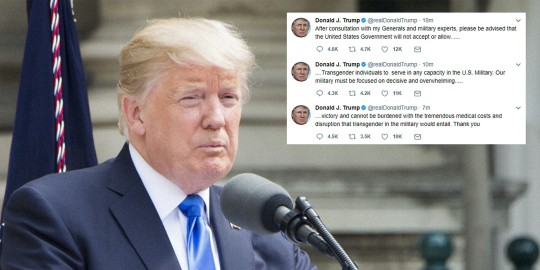
The main characteristics of this new scare, in my opinion are:
A targeting of trans people, gender non-conformity, and drag performance as subversive elements in society that pose a danger to the "traditional family", christian hegemony, and the wellbeing of children.
The platforming of extremist right-wing propaganda from various sources in mainstream media and political discourse, which all spout unified transphobic talking points that inspire discriminatory policies and violence through stochastic terrorism.
Transphobic policies being passed into law at a rapid pace on the state level in multiple states, with little to no federal intervention. (This refers to the US specifically)
Domestic stochastic terrorist attacks on queer spaces that prominently feature and support trans communities and drag performance, which are inspired by transphobic right-wing propaganda.
The boosting of TERF voices who pitch the same transphobic talking points as the right, from a pseudo-leftist perspective that serves as an alternate route of attack in the insemination of violent transphobia into the mainstream. (This is especially prevalent in the UK)
The "groomer" narrative, which links trans people, gender non-conformity, and drag performance to pedophilia in an effort to evoke strong emotional reactions from misinformed people prone to bigotry and reactionary thinking. This tactic can also be seen in action with the Q-Anon conspiracy cult.
Utilizing trans people, gender non-conformity, and drag performance as scapegoats for economic decline, political unrest, and poor quality of life in order to disract from the systems actually responsible for these problems.
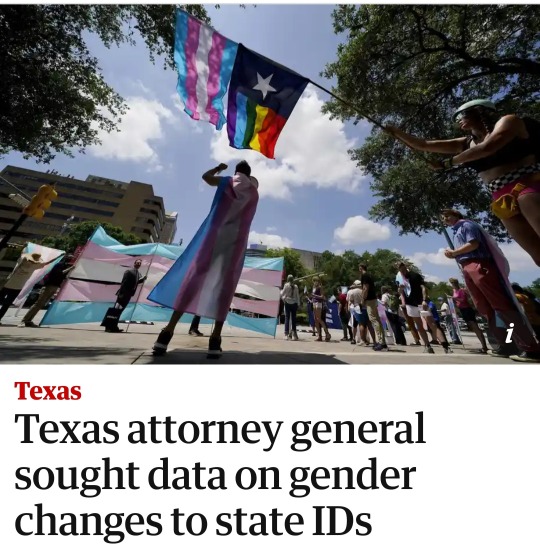
Link to article
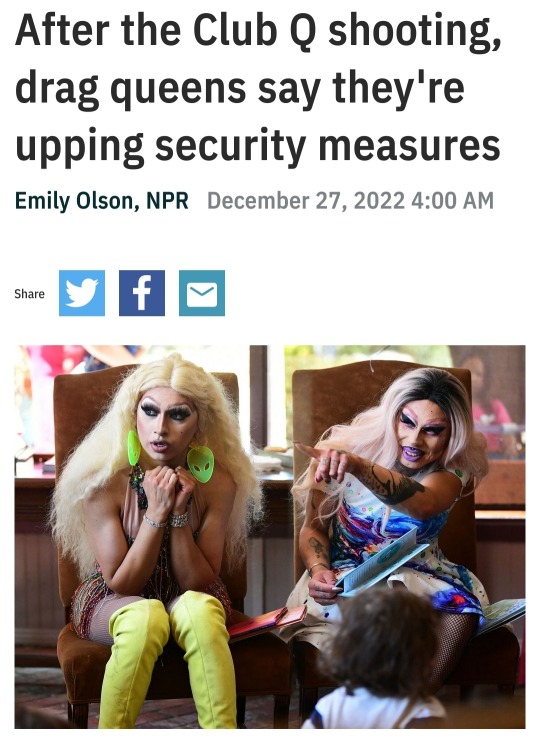
Link to article

Armed Proud Boy protest against the Holi-Drag Storytime in Columbus, Ohio, and counter protesters protecting the event.
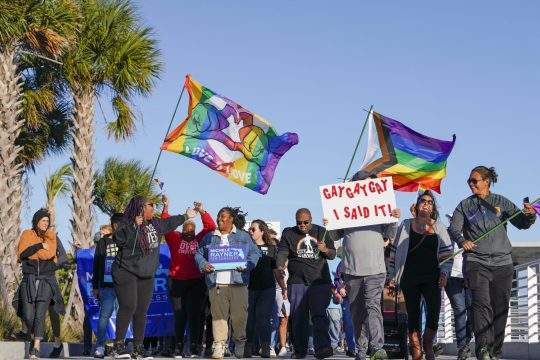
Protesters against Florida's "Don't Say Gay" bill
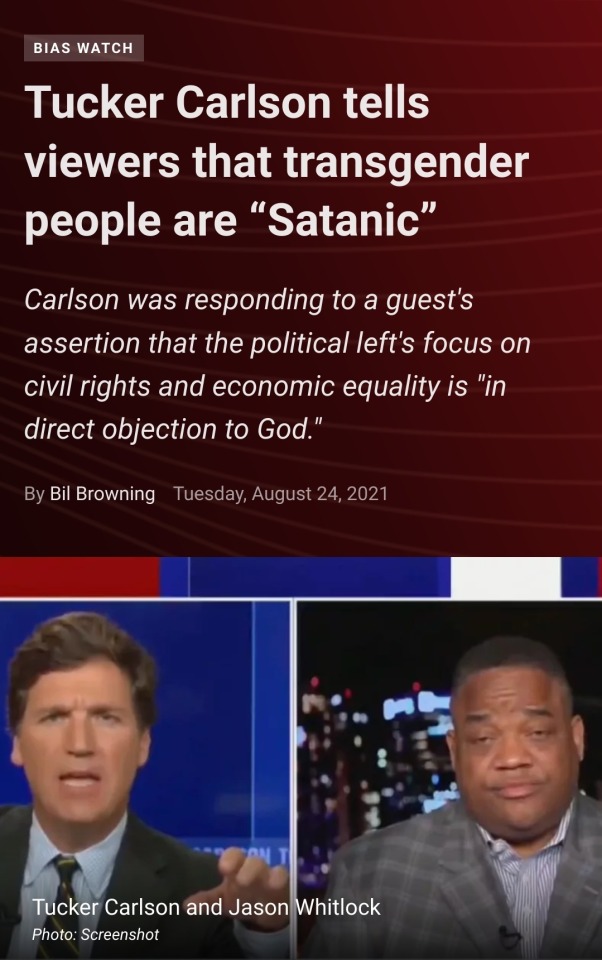
Link to article
I would also like to add that unlike the 1st Lavender Scare, this is not just an American phenomenon but part of a clear and roughly coordinated multinational right-wing movement and is presenting just as prevalently in the UK (albeit in a slightly different form). It is dangerous to leave this reactionary movement unstated and unnamed, lest is become normalized.
#ask#anon#long post#the lavender scare#the 2nd Lavender scare#us history#us politics#politics#transphobia#homophobia#queer#trans#transgender#lgbtqipa#lgbtq+#nonbinary#gender noncomformity#gnc#drag#drag performance#informational
1K notes
·
View notes
Text
It's so interesting to me that the widely accepted theory for Deltarune is that it'll end up being Us, the player, vs. Kris in the end. I understand why this is the perspective a lot of people have- Kris doesn't rip their soul out for no reason, obviously, and based on everything we've seen, such as the Post Spamton-NEO dialogue choices, it very much seems like we have the ability to make Kris make choices they otherwise wouldn't- but it seems especially cynical to me to assume that means Kris is going to be against us, or even that there is an antagonistic relationship between Kris and the player at all.
From everything we've seen, such as Kris' room in the light world being almost completely barren, and Toriel's memory of Kris asking when their horns would grow in, it doesn't seem like Kris likes themselves that much- and with that perspective, and the knowledge via Catti that she and Kris used to try and summon demons together, I've always had the perspective that we exist within the narrative of Deltarune less as a malevolent outsider forcibly imposing our will on the world and more as a benevolent force, called on deliberately by Kris' own actions to help them reshape their life into something they like more.
I think people tend to get very caught up in thinking of UTDR as very inherently cynical stories, especially in their metanarratives, due to the Undertale Genocide route. But that isn't what these stories are- or rather, it's not what they're *supposed* to be. The Genocide route, and its Deltarune counterpart, the Weird/Snowgrave route, are *corruptions* of the existing story and world, caused not by the player's mere existence, but by the player's refusal to engage with the game the way it asks you to- for Genocide, you have to actively go out of your way, to great resistance, to hunt down and kill every single monster, despite the game telling you that showing mercy is the best option. And in Snowgrave, you have to actively push back against the existing narrative in very specific ways, using the more diverse combat system to circumvent the restrictions it has- rather than attacking enemies yourself to kill them, as that simply causes enemies to run away, you circumvent this by manipulating Noelle to freeze them all with Iceshock, preventing them from running away. Noelle DOES NOT do this deliberately based on everything we've seen, and it is very apparent from her dialogue (both internal and external) that it is unnatural to her and that we, the player, are making her do this. And in the Snowgrave route, it is very understandable that Kris would take an antagonistic stance towards us, given, well, Snowgrave, but it must be remembered that the Snowgrave/Weird route is paralleling the Genocide route, and how did that route end? With the demon that comes when you call its name ushering the world, and our influence upon it, into oblivion. That sounds to my ear awfully similar to how the Roaring has been described. Some people have theorized that perhaps the Weird route will be necessary to avoid the Roaring happening- but what if it's the opposite? That's a separate subject, though, and I'll leave it for later. Given all the very apparent parallels between Kris' design and Chara's, mirroring the parallels between Snowgrave and Genocide, it makes perfect sense that Kris would be antagonistic towards us at the Weird route's end- but in the normal route, what have we truly done to warrant antagonism from Kris?
It's very heavily implied, if not outright stated, that Kris' life before Chapter 1 is... not exactly good. Their parents are divorced, very messily, their brother is away at college, their friendship with Noelle has grown distant, and they've been unable to befriend Susie like they wanted to. But then, we show up, almost out of nowhere, and Kris is whisked away on a magical adventure, where they can be the special version of themselves they've always wanted to be. Sure, they can't use magic themselves in the Dark World, but they can ACT, which seems to be enough. And yes, we can make choices they don't necessarily agree with, like saying Kris is fine after Spamton NEO, but Kris also has Ralsei and Susie as a support network, who see through that lie- and many of us don't make that contrary choice at all. I know *I* didn't. And the crucial thing to remember- we aren't completely controlling Kris. Even when Kris HASN'T removed the Soul, they've acted independently of us. They block King's attack at Susie, they back away from Spamton NEO, and perhaps most importantly of all, is Ralsei- Ralsei, who on two separate occasions actively stops Kris from being observed by us, proving this is possible both without removing the Soul, AND for people other than Kris to do. Kris is not a slave to our will- they go along with us by choice, even when we make decisions they don't agree with. Because they DO have the power- the Determination- to resist us. But they don't. What does that tell us about Kris, and the greater narrative?
Circling back to the metanarrative point to conclude this excessively verbose post, what we need to remember moving forward is that Toby Fox is not a cynical writer- at least, not by nature. He expects you to engage with the narrative he constructs on its own terms, as any writer would, but he also wrote the Genocide route specifically to deconstruct how the refusal to do so will inherently ruin the story. As Sans says when he dunks on you, if you actually cared about being friends with him, you wouldn't be on the Genocide route. There's no reason Deltarune won't be the same. Undertale did not punish the player for playing the game, it critiqued the player for not engaging with its narrative. Our ability to Save and Load didn't make us evil- our influence being exerted on the world of Undertale wasn't inherently bad. Even when it comes to actions like killing Toriel at the end of the Ruins and reloading to spare her- this isn't evil. In fact, it is the opposite. Flowey attempts to make us think it is, but he's already been lost to the same apathetic lack of engagement that we are in the Genocide route. Our presence in Undertale is not inherently negative- without our part in that story, the monsters would never have been freed from the Underground. I have no reason to believe Deltarune will be any different.
TL;DR: Our influence over the story of Undertale was not inherently bad unless we misused it by refusing to engage with it on its terms. This led to the Genocide route. The Weird/Snowgrave route is a deliberate parallel to this. As such, there is no reason to assume our influence over Deltarune is inherently bad; it will only be bad if it is similarly misused. The same can be said about our relationship to Kris- it is not inherently antagonistic, and has no reason to be unless misused, such as in Snowgrave.
68 notes
·
View notes
Text
this isn't @ anyone or any particular post, but. I do find myself questioning whether it's useful to distinguish "anti-masculism" from like... misogyny and patriarchy.
maybe it's just me, but narrowing the definition of "misogyny" to just describe contempt for women, specifically, has never felt super accurate to me; the overall system of oppression being described here isn't just about a dislike of women, it's a functioning system (patriarchy) relying on, and as a product of, systemitized misogyny. It's misogyny in a dominant role of power.
And that system (as it currently exists) also requires that gender roles are strictly followed and fulfilled, including by men. It requires no deviance; no queerness and no transness. It requires that women be babymakers and caretakers and sexual gratifiers, and it requires that men be protectors and dominant breadwinners, and seek out sex. (Among other things)
I think it's helpful to expand our understanding of misogyny to include the aspects of it that necessarily impact men; it's not just the toxic masculinity that hurts others, but the system that rewards and punishes conformity to misogynistic gender roles.
"Anti-masculism" feels like it's trying to describe an aspect of this; the way this system views masculinity as brutal and violent and monstrous, especially in relation to men of color, and as a corrupting force- particularly when in contact with (whoever patriarchy views as) women.
And these things exist, and happen, but (obv) so does a mirrored phenomena for femininity; are we calling that "misogyny", to the exclusion of attitudes toward masculinity? Because I don't think it's accurate- and tbh I think it's actively counterproductive- to define that by gendered expression rather than perceived gender.
I honestly think it does more to say that these are all a part of misogyny, and to identify contempt for certain expressions of masculinity as being inherently, necessarily intertwined with other parts of misogyny. Patriarchy relies on all of these things to function, and we need to get folks to understand that challenging these attitudes toward masculinity is, in fact, a crucial part of the fight against patriarchy.
I don't think it works to say "misogyny" is an umbrella term that enconpasses all of this, and that "anti-masculism" just falls under it, either; just practically speaking, I don't think it's helpful to differentiate this particular thing as separate from similar attitudes toward femininity. It's super easy to separate the word from that context (esp without a counterpart for femininity), and while I hate having to factor in optics, I do think there's a parallel here to "transmisandry" in the possible interpretation of the word to mean that men are oppressed/misogyny doesn't exist. Even if we know that's not the intent.
And I don't think it accounts for differences between how either of these manifest for cis vs. trans people, gender-conforming vs. GNC people, straight vs. queer people, white people vs. people of color, etc.; how and why it shows up is gonna be wildly different based on whether you're being presumed more masculine or feminine because of your race, size, or disability status, or whether you're being punished for not conforming to gender expectations one way or another- which will also look different for trans people who present more in line with what's expected of their AGAB vs. their actual gender.
Also- I'm saying this here because I'm open to discussion. I feel like I've read enough about it by this point to have an opinion, but I could absolutely be lacking some crucial info, insight, or perspective, and I want folks to engage with this as a mutual conversation.
613 notes
·
View notes
Text
Note: I am finally posting this (something that has been in my drafts for actual months) because @pinkeoni hurt my feelings talking about Will and Alan Turing). So...you can inavertently thank Robin for this LMAO
I don’t delve much into Stranger Things analysis anymore, but having just watched The Imitation Game, the biopic they made about Alan Turning in 2014—I’m thinking that maybe Will doing his presentation on the man might have an delightful (secondary) parallel to this film’s exploration of him, given Will’s burgeoning queerness + ongoing relationship with normalcy.
Throughout the film, the ongoing theme of "differences bringing about greatness/change" permeates every character, but Turing especially—something that the conversation he has with a character named Joan near the end of the film showcases well:
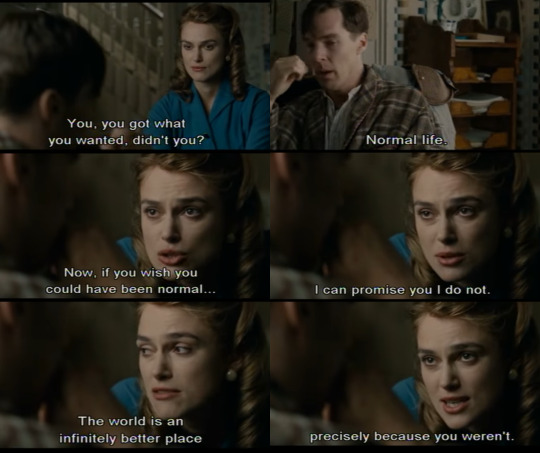
In this conversation, Joan is trying to encourage Turing to come out of depression and rely on her, given he is struggling immensely with physical effects of chemical castration—which he obviously resents, but feels is better than giving up the life he has and being “entirely alone” because of his sexuality / desires (sound familiar)?
This ongoing exploration of queerness as tied to greatness and/or otherness is something that is very often explored in Stranger Things as well, primarily with Will—to the point where Will has nearly the exact conversation Alan has with Joan with Jonathan in S2:
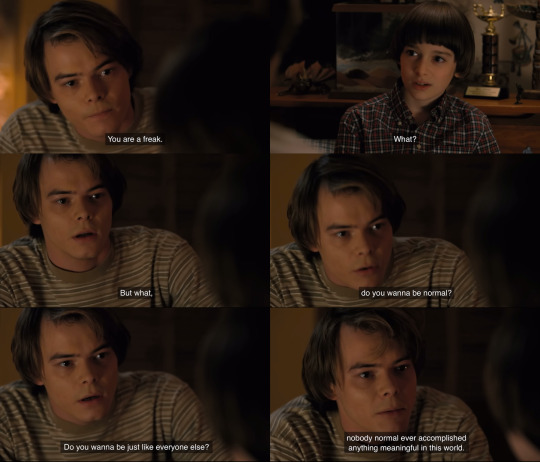
—in addition to us exploring the relationship between a lack of normalcy, queerness and even nerdiness through/by other characters like Robin, Mike & Lucas.


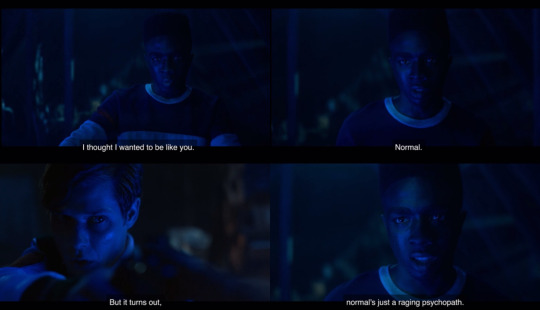
Now (as we all know), Will’s homosexuality has been forever and inherently linked to his otherness/lack of normalcy—whether with how he was bullied in S1-S2, his struggle to be open with his feelings for Mike in S4, or the million literal / metaphorical things in between, Will has always been encouraged not to conform, but still struggles to self-actualize enough to embrace himself fully…which most of us expect for him come S5.
Basically: the underlying theme of this film for Turning (much like the underlying themes at the heart of ST) revolves around how most people strive for normalcy, despite normalcy being undesirable if you expect to do anything great/interesting. While Turing was a homosexual man, he was also one who struggled greatly with fitting in overall—much like Will, which I think perfectly reflects how the Duffers have set up their S5 resolution + solving Will’s ongoing internal struggle with his romantic feelings for Mike + ongoing dissonance with normalcy.
(sidebar: there are articles exploring the idea of "embracing difference" in this movie that parallel Will's "Being Different." See: Embracing Difference - The Imitation Game)
Both TIG!Turing and Will exist in on the fringes on their respective worlds due to their differences and homosexuality—just as both of them are both most inspired by their (romantic) love for their male best friends....to the point that those relationships define their contributions to the story: Turing with the machine that helped the Allied powers break the Nazi Enigma code, and Will in ways I'm sure we'll be talking about in 2025.

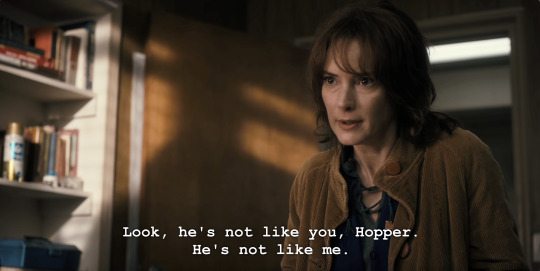
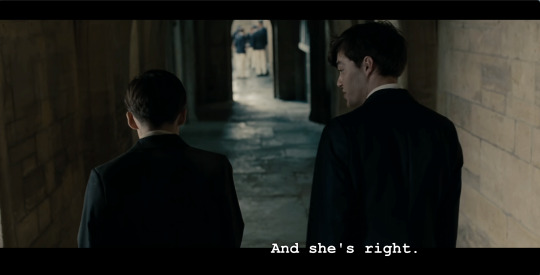


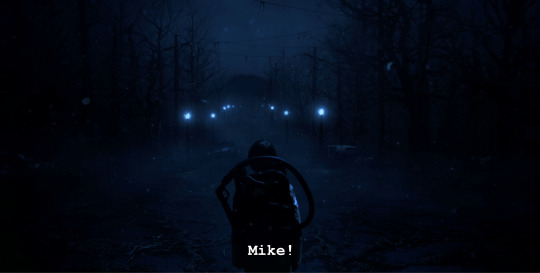
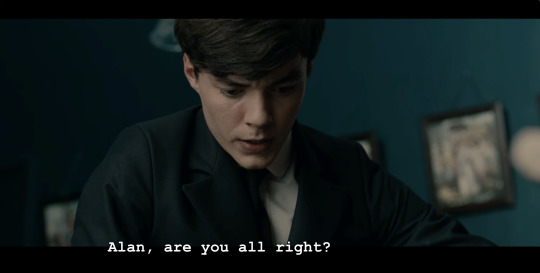
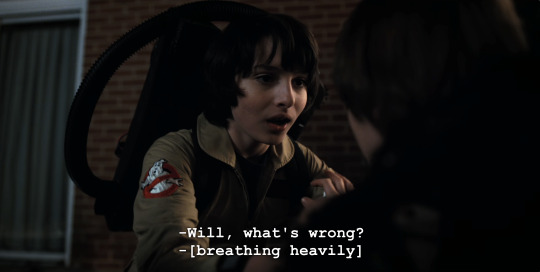
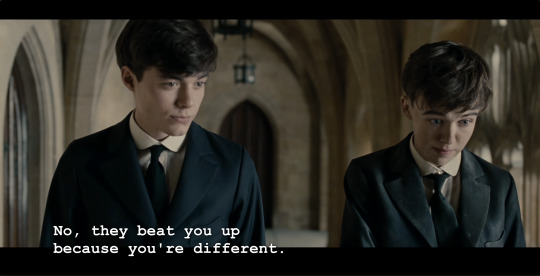

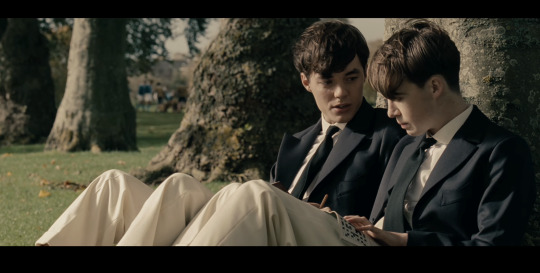
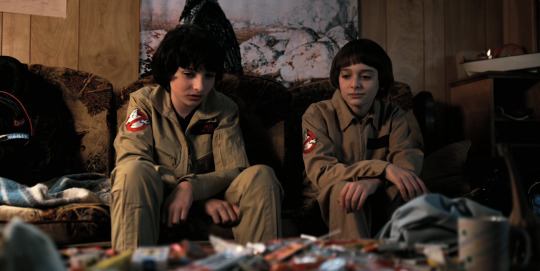
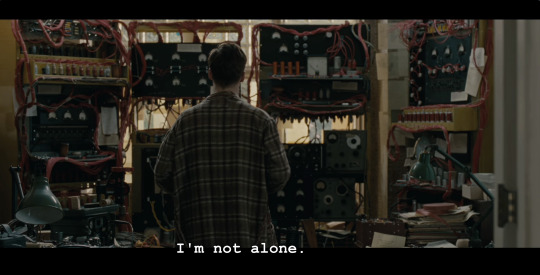
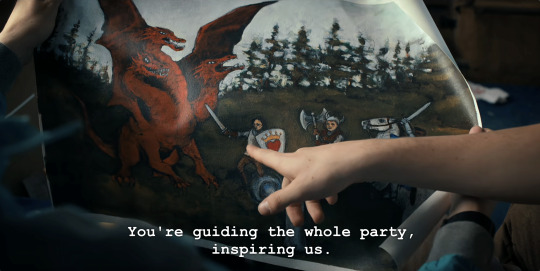

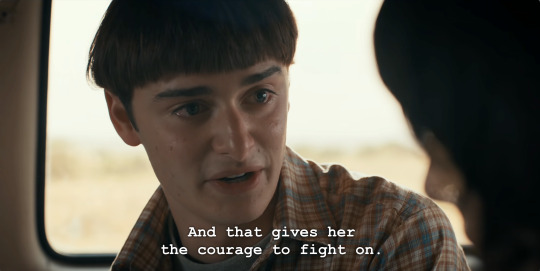
TL;DR: While Will still has another season to sort through what his love for his best friend means for both his rejection of normalcy and his greatness, it's fairly apparent that (much like Turing) it is the embracing of both difference and homosexuality that leads to greatness—no matter how the world feels about that overall.
(We love it when the gays learn life lessons (and when they win)).
#byler#will byers#will byers core#alan turing#st analysis#my st commentary#st commentary#st parallels#stranger things#suprise byler commentary from Marie for Christmas? more likely than u think#this has literally been in my drafts since...at least four months lol. I pulled a bunch to finish it and I'm glad I did lowkey.#Its not stuff I talk about much anymore but. you will never not see me showing the masses how ST storytelling is reflected a MILLION places#ANYWAY#the me tag#gay mike wheeler#only kinda but. yes lol
124 notes
·
View notes
Text
it’s upsetting to me that despite setting up each league member to have a specific and beautiful depiction of the ignorances of hero society in their own way, the story never really considers their words at all in making change for the betterment of said society. these are my thoughts regarding the conclusion of the villains, by each character…
shigaraki’s entire character boils down to the fundamental message of society, both heroes and civilians, ignoring the downtrodden who are in dire need of saving, just because it’s inconvenient for them. shigaraki represents those downtrodden people - the neglected children, the poor, the desperate. he represents that criminals are made, not born. yet, despite the beautiful set up we had with his entire being paralleling izuku’s, his monologue during his fight with endeavour, and him deliberately stating he needs to be a hero for the villains, this is just thrown to the side in the end. izuku didn’t save anything when it came to shigaraki even though he vowed to do so when nana shimura asked him if he had the ability to kill her grandson. he said he wouldn’t, but that’s what happened in the end, isn’t it? was the crying child within him who dreamed of being a hero not enough to communicate his humanity to the heroes? in the end he was just a small boy, remaining neglected by the people who were meant to hold his hands and save him. he didn’t even get to reconnect with the other league members - his dear family, in the end. kurogiri had said, his friends were waiting for him.
toga represented the rejection of people with unconventional quirks and how she’s punished for just being who she is. she can’t help who she is. in the bnha society, since her quirk isn’t glamorous or conventional, she is looked down upon and immediately labelled inherently evil for acting upon her desires. nobody in her previous life tried to understand her, not even her parents, as they resorted to counselling in hopes of suppressing her over helping her. and yes, ochako did understand her in the end which can somewhat serve as closure for toga because her love was returned, it’s still unfortunate that only ochako will understand her and nobody else. society will go on judging people with said unconventional quirks without hesitation, not taking the time to understand how hard it is to be shunned over something out of your control.
speaking of the view of differing quirks, it brings us now to spinner and his mini-arc of fighting for the visibility and acceptance of heteromorphs. we literally see the existence of cult groups in the story that are against the existence of heteromorphs in society because of their appearance. my complaints are mainly directed at horikoshi for fumbling the concept of discrimination and fighting for the liberation of the oppressed, especially since it directly reflects concepts of racism, colourism, and alienation in real life. although, i would be lying to say it isn’t a somewhat realistic depiction of how fighting for rights is widely frowned upon. in order to make change come about, society must be disrupted. that is exactly what spinner did in the end, and was met with shoji and koda telling him he must sit and wait peacefully for change to come about - which we all know does nothing in the long run. it’s so upsetting to me that spinner, the one who is undoubtedly the closest to shigaraki within the league, had the outcome he did. he had so much compassion for his cause in bringing about stain’s will, and it just hurts seeing his moment watered down to his nomufication and demonization of the heteromorph revolution.
then of course, is dabi. his entire drive was to prove how terrible of a person endeavor is, and how contradictory it is that someone like him saves people for a living. dabi is an embodiment of all of endeavor’s sins, coming back to put him in his place. however, in dabi’s conclusion with all his family members being there when he nearly combusted, endeavor’s words of atonement (i’m using this word very lightly because what really did he atone for anyways) will never be heard by the greater society. all the civilians will understand is that endeavor brought down his estranged villain son. people will most likely move on from the fact that he abused his family in order to focus on his ‘bringing down’ of dabi (which honestly was all on shoto’s part) and ultimately saving the day. people will not take dabi’s existence as a catalyst for critical thought into who exactly they call heroes and question the integrity of heroes - what are the kind of people that save them.
speaking of questioning the integrity of heroes, this leads into stain. i don’t have too much to say about him but i think it was stupid to just have afo kill him. he wasn’t a villain, he was a vigilante. i think it was such a waste of his character to just have him show up in the story, get jailed, and then have one interaction with all might. i feel he could’ve done so much more with communicating his cause to society, and in reaching regular civilians rather than sparking a flame in the hearts of some villains such as spinner. what a shame. what a waste.
also, i want to mention twice. i loved twice so much, he definitely stuck with me. i thought the concept of “all it takes is one bad day” was such a perfect thing to include for a villain character. his entire life was changed for the worse over a motorcycle accident when he was a teenager. though living in his loneliness which was ultimately destroying him, he had met the league. the members of the league, especially toga, served not as a stepping stone to use and swing his life around in that way, but simply as friends. a family, that he found a place in despite everything else that had gone wrong for him. he had this one thing going for him, and he was abruptly torn away from it with the touch of a feather. he wasn’t even asking for much, he had just found his people - his place in the society that rejected him over a very human mistake, where he could live as himself. and to top it all off because apparently that wasn’t bad enough, shigaraki doesn’t even know he died - and if he did, there was nothing shown for it. another fumble by horikoshi.
tldr; what pains me the most in all of this, is that not only are all the league’s reasons for fighting wholly overlooked by the heroes, but none of what they stood for is going to be considered in the end for reconstructing a just society. their words, their pains, and their dreams are all going to be brushed aside in preference for society simply celebrating their deaths and incarceration. because in the end, all the humanity within themselves that they bared to the world in their fight is going to amount to nothing to people who just wanted them gone. nobody is there to mourn them.
and it hurts so bad.
39 notes
·
View notes
Text
Okay so I can’t find it but I saw a post about wishing at least one other character would acknowledge there’s a reason House doesn’t want to go to his dad’s funeral. And I wanted to say that I agree with this. And I think it’s the point. And that House as a show was also subverting expectations, so I wanted to talk a little about this.
So first off, I think it does really interesting things when you take a non-diegetic / non-in-universe approach to the show.
One, this was Supernatural era. You know, the show that sometimes categorized the dad (who would leave his child sons alone for weeks at a time, was sometimes implied to hit them, and openly shamed them especially Dean) as the only true hero. And also iirc a lot of shows and movies at that time centered around the theme of forgiving your abusive parent.
Two, in the previous season, we get an episode that canonically parallels the severe traumas of rape and physical child abuse.
Three, House never apologizes or forgives his dad. Yeah, he’s a misanthrope, so there’s a narrative excuse there, but he’s also allowed to do it. And he’s right about his dad not being his bio dad.
Four, for the above reasons, it is reasonable to view the narrative as being on House’s side. He goes because of extreme social pressures (which exist in the real world!) and, possibly, because his mom wants him there. But the narrative essentially says that his dad was a bad person and House shouldn’t have had to go. (With the possibly caveat of ‘[even shitty] funerals are sometimes a place to reconnect with living people you actually care about.’)
Part Two: Diegetic / In-Universe
House’s mom. This is really interesting, right? House’s mom is brought up over and over again. And the narrative thread is—she was abused, too. Should House connect with her? And if so, why and under what circumstances?
And what’s really interesting is, House doesn’t want to under the given circumstances. Because it means submitting to social mores he doesn’t agree with, including the circumspect of implying, “My dad was a good guy.”
But his mom doesn’t seem to see it quite the same way. “He’s not going to care [that we started late], Greg. He’s dead.” Essentially saying, this really isn’t about him. He’s dead.
So it’s this moral ambiguity again. Can and should House align with his also-abused mother? What would it cost him to do so? (And implied: childhood abuse can have lingering impacts forever, especially when people dismiss it because - the war is not over.)
To me, this episode is one of the examples where many characters take on roles as foils to expose a narrative theme. In this case: social pressure around “respecting your parents.” And I think it’s brilliantly done. I think when you have the overwhelming suffocating feeling of WHY ISN’T ANYONE LISTENING TO HIM
I think that’s EXACTLY the point
These motives are, to a degree, being placed on the characters. It’s extremely well-written, so it feels authentic, but to me it’s just as likely Chase would say “he shouldn’t have to go” and Cuddy with her mom would be more sympathetic. But the writers chose to unearth all the reasons each of them would put social pressures on House. And this happens to people in real life.
And of course, Wilson. It’s not inauthentic for Wilson. He’s doing two things at once. One, he’s playing out his own issues around social obligation. Two, he’s grabbing onto “I am socially obligated to be around House” like a lifeline.
Which leads us to the second theme of the episode, which is inherently true to the characters and deeply humanizing.
Complicated grief.
House’s grief is complicated because of social pressure. And he’s not sad his dad is dead—he’s sad that it changes nothing. Like he says to the kid with the facial deformity: “you can change your face, but you can’t change who your face made you.” House can change his circumstances. But he can’t change who they made him.
And Wilson’s grief is complicated because his girlfriend died suddenly, violently, unreasonably. And his best friend was deeply involved—in trying to save her and in her ultimate loss. He’s terrified of losing people and he almost lost them both. And because it’s Wilson, he represses, justifies, and misunderstands his own motives which makes everything harder. And it’s also deeply real. People compartmentalize. They misunderstand their own feelings.
So yeah! This episode is a twofer. One is meant to make you scream internally about the social pressures around funerals and abusive parents. The other is about complicated grief and mourning, and reconnecting despite and sometimes because of death.
The complexity gives me brain worms. I love this episode.
39 notes
·
View notes
Text
CANARIES, NIGHT SHIFT AND THE MAGNUS PROTOCOL (tma/tmagp/arg spoilers)
Along with everyone else in the fandom, I'm also going FERAL after these new ep so excuse this RANT (this is my way of coping with the brain worms, enjoy ;).
Statement begins.
So what's special about the RedCanary story?
Well, apart from it being a direct reference to the original Magnus Institute (at least the one in this new universe), it's also incredibly fascinating as a narrative tool.
For those who are unaware of their history, miners used to employ canaries in cages while they worked as safety systems. The bird's complexion made them specially sensible to gas leaks which killed them instantly. When a canary stoped singing in the middle of the shift, the workers knew that toxic gas was leaking and had enough time to get out of the mines alive before it got to them.
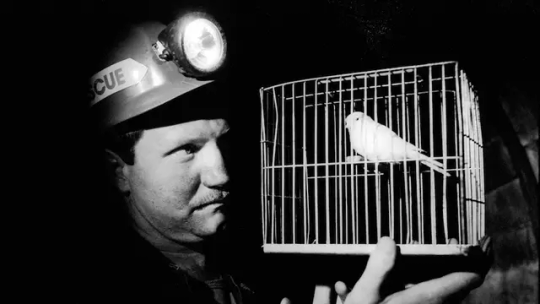
Now why is that relavant to us? Well, the theme of canaries in cages inside mines could be easily applied to the og tma characters. All of them were contained in cages (that is the Magnus Institute) and placed close enough to danger (in their case the paranormal) that only they were aware of its existence while the rest of humanity remained ignorant. That is until the events of the apocalypse when the gas metaphorically leaks everywhere and all humanity is doomed.
However, this proximity to the fears ALWAYS results in the death of the canaries that stayed inside the mines (no i will never get over my blorbos being killed). Everyone involved with the institution dies EXCEPT from Melanie, Georgie and Basira. That is, the only three canaries that actively escaped their cages before the toxic gas got to them.
Therefore, the use of this metaphor at the start of the ep (especially from none other than the voice of Jon Sims, the character who has walked down the path of learning about the entities) is a warning to Sam against investigating the paranormal.
The statement is encountered by Sam because he, above all other characters, is the one who is most likely to end up like Jon and the others. The species of Red Canaries is human breed, therefore Sam being a result of experimentation within The Magnus Institute means he was RAISED to be a canary. Thus, there is an inherent irony on the warning, for it is what PUSHES him to develop an interest on the statements and leads him closer to his tragic destiny.
Another proof that links canaries and the workers at O.I.A.R. is the nature of their habitat. I haven't seen a lot of people talking about it, but there are multiple references in the first and second ep of them working the nightshift. Now, why would a filing job be carried out exclusively at night? (THERE ARE SO MANY REFERENCES TO IT BEING A NIGHTSHIFT I AM NOT KIDDING)

This one is specially interesting because it's the first thing we hear in the podcast. Also Teddy metaphorically being the canary that leaves the mines and the darkness to escape into the outside world and the sun.



Multiple references to it being just the FIRST night of an eternity of nights. (cosmic horror much?)

In any case, there is a parallel between darkness of night and the darkness inside the mines. (or even the entity of the dark, one of the oldest alongside the hunt and the end). I see what you're doing Jonny Sims....
SO YEAH IN CONCLUSION
canaries = characters close to danger (AWARE OF THE ENTITIES)
the miners = the rest of humanity (UNAWARE OF THE ENTITIES)
cages = The Magnus institute/O.I.A.R (TRAPS the canaries)
the fears = toxic gas (HARMS the canaries and miners)
darkness in the mines = the night shift
Statement ends.
*stands in front of a white board with red string linking everything, and the dark scribbled in black marker in the center* I HOPED YOU ENJOYED THIS RANT *tries to fix my disheveled hair that i messed up during the presentation* I AM SO NORMAL ABOUT TMA AND TMAGP Please feel free to discuss in the comments, I NEED THEORIES, I NEED TO TALK ABOUT THIS WITH SOMEONE!!!
#is it longer than i planned?#yes#it's jonny's sims fault for giving me the brain worms#this hyperfixation's got a bit of a KICK to it ngl#i don't need sleep i need answers#WHAT DOES IT ALL MEAN#whenever i rant i need u to imagine me barging into your room with a whiteboard and gesticulating to you violently like an annoying entity#tma#tma spoilers#tmagp#tmagp spoilers#theory#discussion#i am going insane#the magnus archives#the magnus protocol
64 notes
·
View notes
Text
IWTV THOUGHTS!!!!
someone else said this felt like less strong of an ep compared to others this season and i see that as far as it being more set-up for upcoming plot rather than plot itself. but i think it's still a really interesting ep with some really strong moments.... digs into the characters in a way the other eps so far haven't had as much time for.
louis giving up on photography, then later letting go of the ghost lestat. and getting this outside opinion from the art dealer guy that he's got an eye for others' work but his own photos aren't strong. i think it's him giving up on trying to fill the hole in his life that was left by (the things he liked about) lestat. i.e. giving up on trying to be someone he's not. and then acknowledging that ghost lestat's commentary is actually just his own words (the "say apple" dialogue). jacob mentions in the post-ep that louis kind of falls into a lestat role in his relationship with armand because he knows he can manipulate him and get away with a lot, because armand is so insecure. so i think the moment of lestat's ghost losing its illusion and disappearing is in part louis absorbing that part of himself back into himself. acknowledging that he too can be powerful, he too desires control. that's not lestat, that's always existed in him.
WHICH sets up louis saying to armand "i don't know much about art, but i know a lot about running things". louis clearly retains his insecurity about not being able to be an artist like the artists he admires—and this continues to the present day as we see with the photos—but here he's willing to fall back into the role that feels good, the role that he knows he's good at. there's also that funny sort of parallel set up here between louis as pimp and louis as art dealer/theatre business guy/whatever. you can kind of picture him pulling the strings behind the scenes at the theatre, and doing it well. that's unlikely to actually happen now that the coven has claudia's old journals (and also just because they dislike him so much lol) but it's fun to think about.
there's also an interesting connection there with armand's personal history—being sexually exploited, and also being an artist's muse (i didn't catch some of that part bc no subtitles, so idk if i'm fully correct on that). louis' own personal history as a pimp works as a crazy foil to that, even if it's just on a subtextual level. the two of them are not on as level of ground as we might have thought, and armand as the eldest may not have the power over louis that one might assume from their present-day interactions. armand's "yes maitre" is CRAZY
anyways CLAUDIA. i'm kind of wishing we got more inside her head in this ep, especially because she doesn't have that much time left... it's interesting because you can see her spiraling and she says to madeleine how she feels broken, that there's something inherently wrong with her, but even then we still don't get a full window into her mind. it makes sense given the limited perspective of louis and armand as narrators, but still kind of sucks because she's the central female character of the whole show lol.
engaging with the show on its own terms, though, it's interesting how it's set up that claudia is denied subjectivity on multiple levels in this episode.
she's always been denied subjectivity by virtue of being perceived as a child. she's further denied subjectivity by being told to "live" the role of lulu by the coven she calls her family, being told to fully embody this naive, reckless, neglected child. this makes it so that later, when she behaves recklessly (being w/ madeleine), when she calls out louis for again prioritizing his romantic relationships over her, the audience is invited to ask—how much of this is her, and how much is just the role she's literally been forced to embody? she IS naive, and reckless, and neglected, but that is her real life, and her real emotions. by making her play a theatrical part that's a flat, cruel synecdoche of her life, you make her feel as though her real life and justified emotions are nothing but the tantrum of a stupid child. then you invite that (mis?)reading of her by the audience. then maybe, after enough time, she becomes that caricature of herself and is finally lost in the manner that armand suggested (...and orchestrated) in the previous episode.
and THEN, once she's gone, you have the additional layer of lost subjectivity. because she's no longer there to tell her story.
seriously fucked up
i guess the ep is all about ROLES. louis, claudia, armand, everyone. kind of obvious but still a useful shorthand for understanding how louis' and claudia's story arcs here overlap. even in the place where louis says he felt more free (as a vampire, as a Black man, as a gay man) than he did in the states, even in the old country that claudia longed for, they're still both coming up against that double consciousness.
looking forward to rewatching on my usual subtitled piracy site instead of having to cycle thru vpn servers for mega lmao
16 notes
·
View notes
Note
i never really paid much attention to star wars before the mandalorian so please forgive me if this is super obvious but: are we supposed to view the droids as being kind of alive? beings with artificial intelligence? i was very uncomfortable with how the ugnaughts (sp?) were portrayed in the last episode but i didn’t think much of the droids because always just saw them a technological tool. i was a little surprised when the bartender droid gave their monologue about the droids wanting to work and catch the bad droids, and thought maybe they want to work to fulfill their programming. but maybe i should have been more considerate. (i am kind of a dumb bitch too tho so maybe this is just something that’s super obvious to most people and not me :s)
Narratively I think droids are supposed to represent an advanced form of automation - astromechs are navigational droids that handle the immense amount of math that’s required to travel through space, droids like C3PO house linguistic and cultural information for diplomatic purposes, etc. I think originally, given that Star Wars was created prior to the internet being a thing, they were used to represent mass sums of human information, but access to that information was restricted to wherever those droids happened to be in spacetime. They’re essentially mobile computers, but not in the way we think of them (eg phones). But because they’re mobile and have to communicate with human beings without any touch screens or interfaces, especially in the case of droids like C3PO, they are by default anthropomorphised. It’s on par with people naming their roombas. These are tasks that are within human capability, but have been offloaded and automated to make everyone’s lives easier (and probably also many financial and political reasons, but that gets into like, the political economy of Star Wars, which if you talk about that you threaten to take Star Wars too seriously).
But, given how expansive Star Wars is, the answer to your question is maybe sometimes. Chopper in Rebels seems to fill the role of the beloved family pet. L3-37 in Solo is explicitly calling for droid liberation and insists that she and all other droids are equal to organics. Mouse droids likewise seem to be viewed as robotic animals. Mando again makes equivalent droid automation and slave labour.
However, this becomes complicated because there are also actual slaves in Star Wars. The clones are the most obvious example, but the twi’lek as a species also are often enslaved. There are also slaver “planets” and “races” who base their economy off of the buying and selling of slaves (that was in the clone wars, I can’t remember what episodes though). Droid liberation is often framed as inherently farcical in the franchise, but “droid liberation” also exists as a form of deracialised political action, and I mean that in the real world sense - droids are not analogous to a given real world conflict or historical process the way that like, twi’lek are (who even have french accents and speak space french! Now Filoni is an idiot and says this is because he’s drawing inspiration from the French Revolution as opposed to the much more appropriate and obvious Haitian Revolution, but whatever). So when drawing parallels between slavery as a thing in Star Wars and slavery as a real world historical process, it becomes frustrating to talk about, because droid lib is both set-up and punchline, but it’s also the most “acceptable” way to explore ending slavery in SW because it means the white writers don’t have to engage with systemic racial oppression in a way that might make them feel uncomfortable. As a comparison, there are multiple episodes in clone wars where clones refuse to follow orders or try to escape and they’re treated as defective or wrong or insane. That shit fucking sucks and it takes on a much more insidious tone than “haha, the droids want weekends off. how cute.”
And then the counter COUNTER problem with that, which is explicitly invoked in The Mandalorian, is that droids are essentialised to their code or “base functions.” These are facts about a droid that are intrinsic to their nature and cannot be altered or removed, and to attempt otherwise means perverting the “true nature” of droids - they are doomed to be what they were created for (I guess forget about IG-11 being rehabilitated lol). So when you call them slaves, and then insist they are forever shackled to their programming, that’s not a neutral storytelling choice, and you are essentially invoking the idea that there are some races or people for whom slavery is more naturally suited. Which is explicitly a white supremacist idea. And given the context of this storyline in The Mandalorian’s broader political problems, it becomes particularly nefarious.
All this to say - droids are maybe slaves. It depends on the story being told and why, it depends on the writer, etc. But when analogising it to real world history it becomes fraught, given that there are actual slaves in SW who are intended as obvious parallels to real world acts of slavery in human history, a thing that is omnipresent in star wars while also being largely ignored or dismissed by the writers
128 notes
·
View notes
Text
i'm ngl i will be honest. i think one of the most disappointing developments in modern db lore/super is the whitewashing of the saiyans. lemme explain
like if you dont know, dragon ball as a whole is a parody of the chinese epic journey to the west, with son goku BEING sun wukong, but other saiyan characters being given sun wukong's characteristics—such as z broly, whose gold crown is a direct reference to sun wukong's golden headband, which also suppressed his power. the iconic saiyan battle armor is abstracted from samurai armor. so like, it’s pretty safe to say that goku & the rest of the saiyans are coded to be east asian.
it's also important to point out their cultural origin backstory as it was introduced in og dbz filler & how it's presented. in the manga you don't really see any depiction, but you actually get to see the story of the saiyans recounted, and to me, the kind of "uncivilized, barbaric society (the saiyans) invades & destroys peaceful, technologically advanced society (the tuffles)" narrative told alongside the literally racist treatment vegeta, nappa, & raditz received from freeza & other freeza force members in paralleled a lot of the irl historical racist rhetoric perpetuated against a majority of indigenous groups around the world. and there could have been something really interesting done with that, because a lot of what you heard about the saiyans came from word of mouth decades after their planet's destruction!
unfortunately, that potential for nuance wasn't explored much further by both the franchise and mainstream fanon, which was fine ig. though when i was first getting into DB and looking at a lot of fanmade content, i would encounter stuff like "spartan saiyan AUs!!" or saiyans drawn in roman armor, which even back then would make me roll my eyes considering... yknow, lmao. like c'mon, other 'war-like' societies exist, especially outside of europe. the battle armor is based off of samurai armor for a reason.
but i guess that perception of the saiyans became so popular that when super began to be produced, they not only doubled-down on saiyans being an inherently 'evil' race, but with the introduction of the universe 6 saiyans, started kinda.... revising the cultural inspiration of the saiyans?? like cabba's saiyan armor really is essentially inspired by roman leather armor, and so is the armor the main character, Shallot, from DB Legends, as well as saiyan royalty adopting european royal naming conventions... which is literally so strange to me. what do you mean vegeta the fourth
idk it's just something so strange to do as a japanese franchise inspired by a chinese folk epic, but it is what it is at this point 😔
#ooc.#does any of this make sense. i hope it does#otherwise i'll feel like that conspiracy board always sunny image
16 notes
·
View notes
Text
Nimona and its portrayal of the queer experience: a stream of consciousness "essay"
This is not a reach by any means, and I know countless people have picked up on this and/or discussed it at length many times, but Nimona is undeniably a story of queerness and queer people in a hetero- and cis-normative world. Through the use of the “monster” concept, the movie effectively demonstrates the way that the LGBTQ+ community is ostracized and villainized.
Throughout the movie, Nimona’s experiences as a shapeshifter, Ballister’s reactions and assumptions toward her, and other citizens’ perception of her parallel how queer people are treated in the real world. When Ballister first meets Nimona, she chooses not to reveal her ability to shift to him until it is absolutely necessary—quite literally a situation of life or death. Even then, she is reluctant to do so, because she has learned that this ability of hers, although not inherently dangerous or evil, is viewed as such and enforced by the only society that is explicitly stated to exist in the movie’s universe. The reveal of her abilities can be equated to a queer individual’s coming out, and it lines up nicely in the sense that often, people are afraid to come out, even to close friends and family members they have known since birth because of the political and societal stigma around the LGBTQ+ community that’s almost universal. They also often feel pressured to do so.
Ballister’s reaction to the aforementioned reveal also serves as a parallel between the two experiences. After she demonstrates shifting, Ballister asks Nimona “what” she is, repeatedly requests that she appear “normal” while talking to him, and uses terminology that Nimona clearly finds derogatory and hurtful. Part of this is the way he was raised—people who live in the Nimona universe are implied to live in a society where knowledge of those who can shapeshift—widely referred to as monsters—is commonplace. Not only is the knowledge of their existence commonplace, however—it is also widely accepted that those with shapeshifting abilities are evil and intrinsically against the concepts of peace and stable civilization. There is no real evidence for this idea besides a loosely framed “historical event” that has been passed down for one thousand years (as referenced at the beginning of the movie) and has likely been warped and distorted to fit certain people’s biases along the way. The same goes for queer people. The existence of the LGBTQ+ community is widespread knowledge; however, many people associate the community with concepts of perversion or sacrilege and don’t know much about the individuals who it’s made up of past these prejudices. Children are taught to refer to gay and transgender people by slurs, just like Ballister was taught to refer to Nimona as a monster.
Nimona is treated callously by Ballister, especially at first, as if her differences make her less than worthy of respect and decency, and she owes anyone around her an explanation because of those differences. This parallels the way that queer people often feel pressured to come out and that they owe those around them explanations of their identities—think strangers overtly asking transgender people about their genitals on the internet, or even in person, or gay/bisexual/queer-oriented people being questioned extensively in order to “prove” their queerness.
Now, in terms of Nimona’s character and how she herself is a reference to queerness: as a genderfluid person, I identify heavily with this character. For one, the obvious—I feel that my gender identity is fluid, and, if it were possible, would choose to be able to shift between physically male/female/androgynous to match how I feel. Nimona also describes her need to shift between forms. At one point, she explains that not shifting is like holding in a sneeze—resisting a natural biological process. Yes, she can stay in one form, but that is uncomfortable and undesirable for her. She even tells Ballister that staying in the form he at first coins her “normal” one (the human presenting form) would be like dying, or rather, not really living. This really resonated with me and how I experience my gender identity—in spaces where I cannot express myself as the gender I feel makes me feel like I’m living half a life. It’s living with the saturation turned down to the lowest setting.
Another phrase that stuck with me after watching was when Nimona offered Ballister the deal of being his sidekick “forever” if she were to help him clear his name. At first, she offers her hand in her human form but then shifts to the body of a shark. Ballister asks her, exasperatedly, if she can just “be herself—a girl.” Nimona replies, “But I’m not a girl. I’m a shark.” This phrase is important because it communicates that transgender people are not masquerading as something other than themselves—they are being themselves. It is other people who cannot accept the fact that the way they have always seen a person is not necessarily who they really are. In my case, I often worry that people will not see me as myself when I identify as masculine—they might see it as an outfit I put on, or a role I act in. But it is truly me. My masculine identity is just as much of myself as I am when I’m femme presenting, just as shark-Nimona is just as much Nimona as human-Nimona.
This is definitely not all of the examples in the movie, not even all the ones that jumped out at me, but I think this is enough to communicate my thoughts. It was a fantastic movie. WATCH NIMONA.
#I apologize for any grammar and/or spelling mistakes#I am very tired and just finished watching#Nimona#and am a little bit wrecked#like eyes still swollen from crying#nimona movie#nimona 2023#essay#stream of consciousness#queerness#lgbtq#the lgbtq community#queer experience#jamie says#jamie speaks#text#jamie's bullshit#jamie writes#genderfluid#transgender#transness#queer representation#trans representation
49 notes
·
View notes
Note
do you see any RJK / artashipatrick parallels? ive been thinking about it a lot lately and wanted to get ur viewpoint
hi hi hi! I actually saw this opinion a couple of times in Ted Lasso fandom, but personally I don't share it. I AM very curious about your reasoning for it because I love looking at ships from different angles and seeing what people take from them.
my tldr is that I don't think RKJ has anything in common with the Challengers trio, beyond the fact that they're about two men ostensively fighting over a girl while also engaging in the kind of simmering homoeroticism that permeates elite men's sport. (this Marylin Frie quote says it better) I get why this can seem a parallel by itself but, to me, it's just a function of both ships being set in a Sports Media canon. When it comes to characters and their dynamics, these ships are built very differently IMO.
relative to each other:
the Challengers trio all start out as peers, both in age and in relative success level of their careers. They're all finalists in the Junior US Open when they meet. RKJ as a dynamic is absolutely hierarchical in comparison: you have Roy being a Legacy kind of Big Name in the sport, Jamie as the talented up-and-comer who idolised him growing up, and while he has promise, there's non guarantee he can come even close to the kind of career Roy's implied to have had. And then there's Keeley, who's absolutely an outsider in their world, and on a systemic level is much lower down the pecking order. I think Ted Lasso, especially in S1 and S2 does a great job giving an overview of, like, how transactional footballers/wags relationships inherently ARE, even to people who aren't already familiar with the context — not just the financial asymmetry and stark difference in career and life prospects but just, like. She's the girl peeking into the changing room and saying, Hi Boys. Jamie makes a joke about oogling her ass because they are both in on the joke that they fulfil a very specific stereotypical relationship dynamic.
Even if on a personal level both Roy and Jamie really respect and admire Keeley, she Does Not Belong in their hyperfocused sport-as-sexually-charged-rivarly world. Art and Patrick want to fuck Tashi first and foremost because she's a tennis phenomenon, they value her athletic abilities and coaching insight. That's a whole completely different dynamic from what's going on between RKJ. Compare Art and Patrick complimenting Tashi's performance at the US Open to Roy and Jamie "fighting over her" in 3x12 where it's all about who she likes more. As someone who actually liked the bar fight because I think it shows a very realistic ugly side to these characters (*) it's just. two men fighting over a girl. vs two athletes being so impressed by someone who is a girl and also a star athlete in her own right.
(*) asterisk because I absolutely loathed so many writing choices in S3, like, even if I like some seeds of plots I hate how they were executed. Oh my god typing this out is making me want to completely AU S3 of TL. anyway; I have beef with the pacing and stuff around that scene but I like the existence of the scene itself.
Keeley and Tashi couldn't be more different
Tashi is just. Her personality is most similar to Roy's, imo. She lives and breathes tennis. She needs to be around that world to live; she struggles to fill the void left with coaching (and living vicariously through Art to an extent). Keeley, meanwhile, makes fun of Roy feeling like the world is ending when he finally admits to himself that he can't go on any longer. Mind, I think that lighthearted "it's not the end of the world" attitude was precisely what Roy needed to hear at that point, because he takes himself too seriously and needed someone to tell him that he can live without football, actually — but the fact that Keeley just Doesn't Get It on a fundamental level, again, marks her as an outsider to the kind of all-encompassing elite athlete attitude Roy and Jamie share. She doesn't even like football! She's occasionally flighty (good for her). She's turning 30 and doesn't know where her life is going (SO valid). She's a completely different personality than the kind of single-minded all-or-nothing attitude you NEED to make it as a pro athlete. Again: her dynamic with the two men who are into her couldn't be any different than Art/Tashi/Patrick, BECAUSE she's a completely different personality. If she was in Challengers, she'd be one of the normie Stamford kids Patrick and Tashi make fun of.
IDK. I think any similarity between Tashi and Keeley starts and ends at "they're both women". Maybe I'm being uncharitable here! I'm someone who thinks that Keeley's portrayal in fanon flattens her a bit (in the way female characters in the periphery of a m/m ship are often put on a pedestal and shoved off the way) so I'm definitely bringing some of my own baggage here; that's why I'd love to know what parallels others see. But I think she and Tashi have very different neuroses. THAT SAID. If I was writing a crossover Ted Lasso / Challengers fic, I really think Tashi/Keeley would be my ship of choice
10 notes
·
View notes